Directory
More than anything, the Kinder Institute is a vibrant, diverse community of scholars who share not only an academic interest in rigorously unpacking the complex history of constitutional democracy in the U.S. and around the globe but also a commitment to collective inquiry. Both in the classroom and beyond it, our undergraduates, graduate students, and faculty learn both alongside and from one another, and they do so with the kind of civility and interdisciplinary curiosity that is essential to generating innovative scholarship and engaging in productive discourse.
You can contact the Kinder Institute front desk with questions at, (573) 882-3330. For questions specifically regarding undergraduate programs, contact Dr. Thomas Kane, Director of Undergraduate Studies, at KaneTC@missouri.edu.
Use the tabs below to meet the people who make up the Kinder Institute.
Billy Coleman
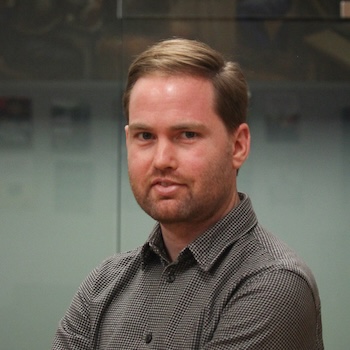
Billy Coleman
Kinder Institute Faculty,
Kinder Institute Associate Director, colemanw@missouri.edu
Billy Coleman is Associate Director of the Kinder Institute, teaches the Kinder-Honors sequence in Revolutions and Constitutions, and is MU Faculty Lead for the Kinder-RAI Oxford Summer School. He is the author of Harnessing Harmony: Music, Power, and Politics in the United States, 1788-1865 (University of North Carolina Press)—winner of the American Musicological Society’s H. Robert Cohen/RIPM Award. His research exploring the relationship between music and politics in early America also appears in the Journal of Southern History, the Journal of the Early Republic, and Oxford Bibliographies in American Literature. He was Book Reviews Editor of American Nineteenth Century History for five years and most recently co-edited Music in American Nineteenth-Century History (Routledge, 2025). Dr. Coleman completed a Ph.D. in History at University College London (UCL) and held postdoctoral fellowships at the Kinder Institute and the University of British Columbia before returning to the Kinder Institute in 2020. Born in Houston, Texas, he grew up in Sydney, Australia, where he graduated with a BA (Hons) in history and politics from the University of New South Wales (UNSW).
Carli N. Conklin

Carli N. Conklin
Kinder Institute Faculty,
Associate Professor of Law and Constitutional Democracy, conklinc@missouri.edu
Carli N. Conklin is an associate professor at University of Missouri School of Law, an associate professor of constitutional democracy and former associate director at the Kinder Institute on Constitutional Democracy, and director of the School of Law’s Center for the Study of Dispute Resolution. She earned her JD/MA and PhD in American Legal History from the University of Virginia, where she received the School of Law’s John and Madeleine Traynor prize for outstanding written work.
Prof. Conklin’s research focuses on early American legal and intellectual history. Her scholarship has been published in the peer-reviewed American Journal of Legal History, the Ohio State Journal on Dispute Resolution, Washington Jurisprudence Law Review, and the University of Missouri’s Journal of Dispute Resolution. She is an invited contributor to the Oxford University Press Discussions in Dispute Resolution book series, including Volume I: The Foundational Articles (OUP 2021), and Volume II: The Coming of Age (OUP 2025).
Prof. Conklin is a past recipient of the Missouri Lawyers’ Weekly Women’s Justice Award (Legal Scholar category) and the University of Missouri School of Law’s Shook, Hardy, & Bacon, LLC Excellence in Research Award. She was awarded a national CHOICE Outstanding Academic Title Award from the Association of College & Research Libraries for her book The Pursuit of Happiness in the Founding Era: An Intellectual History (University of Missouri Press Studies in Constitutional Democracy series, 2019). Her follow-up work, The Pursuit of Happiness Beyond the Founding, is forthcoming from the University of Missouri Press in late 2026.
Prof. Conklin teaches courses in lawyering, dispute resolution, and American legal history at the School of Law and courses in early American intellectual and legal history at the University of Missouri’s Kinder Institute on Constitutional Democracy and Honors College. She is a past recipient of the Kappa Alpha Theta Outstanding Faculty Award (one of ten awardees chosen nationally), the School of Law Board of Advocates Faculty Achievement Award (student-selected), and has been student-selected as a University of Missouri Friars Chapter of Mortar Board Faculty Honor Tap and two-time Mizzou ’39 Faculty Mentor.
Jay Dow
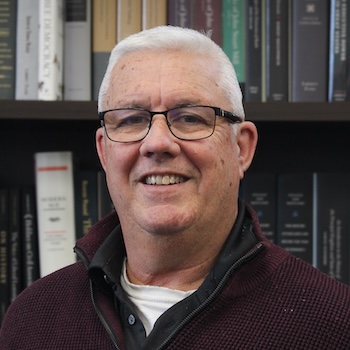
Jay Dow
Kinder Institute Faculty, Advisory Board,
Kinder Institute Professor of Constitutional Democracy, Professor of Political Science, dow@missouri.edu
Jay Dow is Professor of Political Science. Professor Dow joined the University of Missouri faculty in 1992. Before coming to the University of Missouri, he earned an undergraduate degree at the University of Oregon and a Ph.D. at the University of Texas at Austin. Professor Dow’s research focuses on voting and elections, with his current research centered on the development of United States electoral institutions and processes. This is reflected in his Electing the House: The Adoption and Performance of the Single-Member District Electoral System (University Press of Kansas, 2017) and The First Elections: The Rise of Electoral Democracy in the Early American Republic (University Press of Kansas, 2026). Professor Dow regularly teaches courses on American government, parties and elections, and the “Constitutional Debates” course for the Kinder Institute’s Honors College series. He also serves as co-editor for the University of Missouri Press Studies in Constitutional Democracy series.
Katherine Fapp
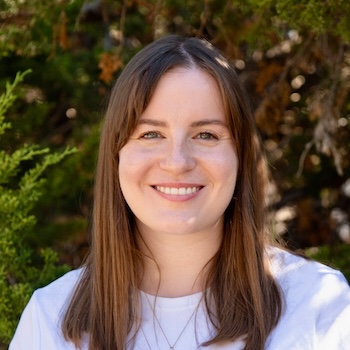
Katherine Fapp
Kinder Institute Faculty,
Assistant Teaching Professor (Kinder Institute, Honors College, Department of History), katherine.fapp@missouri.edu
Dr. Katherine Fapp joined the University of Missouri in Fall 2025 and holds a joint appointment with the Kinder Institute, Honors College, and Department of History where, among other things, she coordinates and teaches in the Kinder-Honors Revolutions & Constitutions social science sequence. Her doctoral dissertation, completed in 2024, focused on American woman suffragists’ activism in the Pacific World at the turn of the 20th century. Illustrating a new side of the transnational woman’s suffrage movement and uncovering the development of feminist networks across that ocean prior to the First World War, it explored suffragists’ use of transnational networks and knowledge creation in their fight for political equality for women globally amidst a world of empires. More broadly, her research interests lie in the histories of women and US politics, US and the world, the transnational and transimperial, knowledge creation, and 20th-century culture.
Interested in the intersection of history and popular culture, Dr. Fapp also produces and hosts the podcast, Flashback: American Historians on Movies. Each episode, she is joined by another historian to discuss a movie related to their field of expertise, how it portrays history, and what we can learn about our relationship to the past from America’s most popular history maker–Hollywood.
Originally from Tucson, Dr. Fapp completed her BA in History, summa cum laude, at the University of Arizona in 2018. She completed her graduate studies at the University of Oxford, where she earned her MSt (Pembroke, 2019) and DPhil (St Peter’s, 2024), and taught for a year as a Departmental Lecturer in the Faculty of History and fellow of the Rothermere American Institute.
Rob Fletcher

Rob Fletcher
Kinder Institute Faculty,
Kinder Professor of British History, Professor of History, r.fletcher@missouri.edu
Rob Fletcher is Kinder Professor of British History and Professor of History at the University of Missouri. His work explores the history of Britain and its empire in the modern period, and the interplay of national, transnational, and global histories. He grew up in Colchester, England, and read Modern History at Magdalen College, University of Oxford. He lived in Tokushima, Japan, before returning to Oxford to complete his doctoral studies. He has previously held positions as the Postdoctoral Research Fellow in Global History at Oxford, Lecturer in Imperial and Global History at the University of Exeter, and Reader in the History of Britain and Empire at the University of Warwick.
Professor Fletcher’s research on the history of Britain’s empire is wide-ranging, and has appeared in Past and Present, The English Historical Review, Journal of Historical Geography, and Journal of the Economic and Social History of the Orient. He is the author of British Imperialism and ‘The Tribal Question’: Desert Administration and Nomadic Societies in the Middle East, 1919-1936 (Oxford University Press, 2015), which told the story of what happened when the British empire and Bedouin communities met on the desert frontiers between the Mediterranean Sea and the Persian Gulf. His second book, The Ghost of Namamugi (Amsterdam University Press, 2019) provided an examination of mercantile ambition and imperial power in Shanghai and Yokohama in the mid-nineteenth century.
Professor Fletcher has been the Principal Investigator on a number of research projects supported by the UK Arts and Humanities Research Council, including a Science in Culture award on the international campaign against the desert locust in the twentieth century. In conducting his research, he has collaborated with a number of museums and public organisations in the UK, Europe, and Australia. His current book project examines Britain’s historic relationship with the world’s desert environments.
Matthew Frierdich
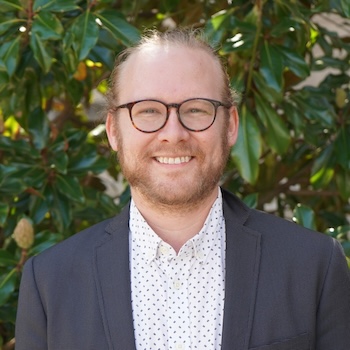
Matthew Frierdich
Kinder Institute Faculty,
Assistant Teaching Professor (Kinder Institute, Honors College, Truman School), mfghp@missouri.edu
Originally from Kirkwood, MO, Matthew Frierdich received his B.A. in History and Government from Drury University, his M.Div from Vanderbilt Divinity School, and his Ph.D. in Political Theory from University of Virginia. Prior to joining the Mizzou faculty as an Assistant Teaching Professor, jointly appointed in the Honors College, Kinder Institute, and Truman School of Government and Public Affairs, he served as a board-certified chaplain at Vanderbilt Medical Center in Nashville. At the Honors College and Kinder Institute, he co-coordinates the new Revolutions and Constitutions social science sequence. His dissertation at UVA, entitled “Turning Rubble and Memory into Seeds: Visions of Democracy in Monument Removal,” focuses on how activism around public memorializations of race and racialized violence offer possibilities and pitfalls for the work of social transformation. As memory becomes a popular political vernacular for articulating justice in the U.S. and elsewhere, the project considers how memory activism raises questions about what democratic engagement must become to cultivate new ways of being human.
To stay grounded in an otherwise chaotic world, Dr. Frierdich loves to tend to his garden, mostly vegetables and a few flowers. He also stays invested in Marvel comics, horror films, and anywhere that sells used books. His partner Emily, son Ezra, and cats Zelda and Tish fill up his cup every day.
Rodolfo Hernandez
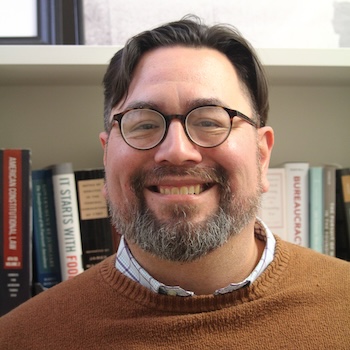
Rodolfo Hernandez
Kinder Institute Faculty,
Kinder Institute Associate Teaching Professor of Constitutional Democracy, Associate Teaching Professor of Political Science, hernandezrk@missouri.edu
Rodolfo (Rudy) Hernandez is a Kinder Institute Associate Teaching Professor of Constitutional Democracy and Associate Teaching Professor of Political Science. His research focuses on political theory and American political development, and his dissertation considers the political economy of Abraham Lincoln’s thought, especially as it relates to the principle of equality expressed by the Declaration of Independence. Recently his work has appeared in The Political Science Reviewer. He frequently teaches American Government, American Political Thought, and Race and the American Story. Dr. Hernandez received his Ph.D. in Political Theory from Louisiana State University (2017) and his B.A. from St. John’s College (Annapolis, 1999). He previously taught as a Visiting Instructor at Louisiana Tech University and as a Senior Lecturer at Texas State University, and he served from 2018-20 as a Kinder Institute Postdoctoral Fellow in Political Thought & Constitutionalism. He also has prior government experience, including having been in AmeriCorps, having worked as a tax examiner in the U.S. Treasury Department, and eight years in the U.S. Army Reserve.
Jennie Ikuta
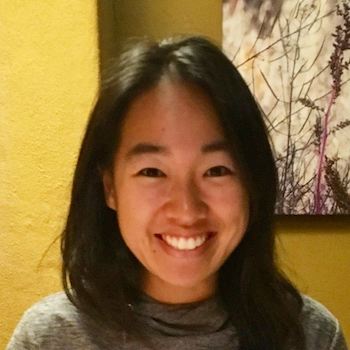
Jennie Ikuta
Kinder Institute Faculty,
Kinder Institute Associate Professor of Constitutional Democracy, Associate Professor of Political Science, jcikuta@missouri.edu
Jennie C. Ikuta is an Associate Professor of Political Science at the University of Missouri-Columbia. As a political theorist, she works in modern political theory (especially 19th and 20th century thought), with a focus on moral psychology, race, and democratic theory. For the 2025-26 academic year, she is a Racial Justice Fellow at the Carr-Ryan Center for Human Rights at Harvard Kennedy School.
She is the author of Contesting Conformity: Democracy and the Paradox of Political Belonging (Oxford University Press, 2020), and her articles have appeared in journals such as The Journal of Politics, Political Theory, and Polity. Currently, she is completing a second book project, White Losses: Moral Psychology and the Demands of Racial Justice (under advance contract, Oxford University Press). This project has been supported by the National Humanities Center; the Bogliasco Foundation; the W.E.B. Du Bois Center; Magdalen College at the University of Oxford; and the Oklahoma Center for the Humanities.
She holds a B.A. from the University of Chicago (2007) and a Ph.D. from Brown University (2014). Born in San Diego and raised in Yokohama, she calls both California and Japan home.
Scott LaCombe
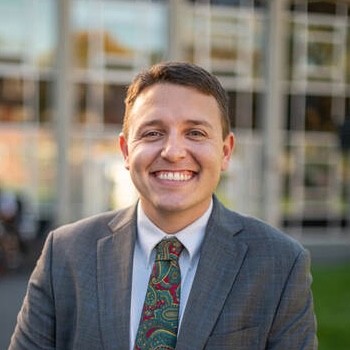
Scott LaCombe
Kinder Institute Faculty,
Kinder Institute Assistant Professor of Missouri Politics & Constitutional Democracy, Assistant Professor of Political Science, sjlacombe@missouri.edu
Scott LaCombe is an Assistant Professor of Political Science in the Truman School of Government & Public Affairs and an Assistant Professor of Constitutional Democracy at the Kinder Institute. He received his Ph.D. in Political Science from the University of Iowa.
Scott studies American politics with a focus on state-level institutions, policy diffusion, and political responsiveness. His research examines how states learn from one another, how institutional rules shape policy outcomes, and how citizens influence—or fail to influence—state policymaking. He combines quantitative methods, including network analysis, with theories of federalism to better understand the dynamics of policy change in the American states.
He also investigates how policies shape population health, economic outcomes, and political behavior. In addition to peer-reviewed publications, he is a co-author of Choosing the Future: Technology and Opportunity in Communities with Karen Mossberger and Caroline Tolbert (Oxford University Press).
Marcus P. Nevius
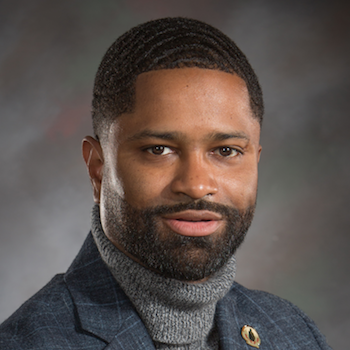
Marcus P. Nevius
Kinder Institute Faculty,
Kinder Institute Associate Professor of Slavery and Atlantic World History, Associate Professor of History, mpnevius@missouri.edu
Marcus P. Nevius is Associate Professor of Slavery and Atlantic World History at the Kinder Institute on Constitutional Democracy, jointly appointed in the Department of History. He leads undergraduate and graduate seminars in topics of slavery, the Revolution, Confederation, and Early Republican periods in the early United States, and seminar topics in the history of the African diaspora in the Atlantic world.
Nevius is the author of City of Refuge: Slavery and Petit Marronage in the Great Dismal Swamp, 1763-1856 (University of Georgia Press, 2020). He has also published “New Histories of Marronage in the Anglo-Atlantic World and Early America,” in History Compass, and “Global Warfare, Conspiracy Scares, and Slave Revolts in a World of Fear,” Review of Books, in the William and Mary Quarterly. He has published book reviews in Slavery and Abolition, the Journal of African American History, the Journal of Southern History, and H-Net Civil War.
Nevius’ work has been supported by research fellowships granted by the William L. Clements Library at the University of Michigan; the Special Collections Research Center of the Earl Gregg Swem Library at the College of William and Mary; the Fred W. Smith National Library for the Study of George Washington at Mount Vernon; and the Virginia Museum of History and Culture in Richmond.
Nevius holds the Ph.D. in history from The Ohio State University, and the B.A. and M.A. in history from North Carolina Central University.
Jeffrey L. Pasley

Jeffrey L. Pasley
Kinder Institute Faculty,
Kinder Institute Chair of Early American History, Professor of History, pasleyj@missouri.edu
Jeffrey L. Pasley is Professor of History and Journalism, Frederick A. Middlebush Chair of History, and the Kinder Institute Chair in Early American History. A graduate of Carleton College, he was a reporter-researcher for The New Republic and a speechwriter for Al Gore’s 1988 presidential campaign before entering academia. He completed his Ph.D. in the History of American Civilization at Harvard University and taught at Florida State University before coming to Missouri in 1999. His teaching and research focus on American political culture between the American Revolution and the Civil War. Professor Pasley is co-editor of Beyond the Founders: New Approaches to the Political History of the Early American Republic (2004) and author of “The Tyranny of Printers”: Newspaper Politics in the Early American Republic (2001) and The First Presidential Contest: The Election of 1796 and the Beginnings of American Democracy (2013), the latter of which was named a finalist for the prestigious George Washington Book Prize.
Emily F. Regier

Emily F. Regier
Kinder Institute Faculty,
Kinder Institute Assistant Professor of Constitutional Democracy, Assistant Professor of Political Science, eregier@missouri.edu
Emily F. Regier is an Assistant Professor of Political Science in the Truman School of Government & Public Affairs and an Assistant Professor of Constitutional Democracy in the Kinder Institute on Constitutional Democracy. She received her Ph.D. in Political Science from the University of Pennsylvania and her J.D. from Harvard Law School. Emily works on American constitutionalism, public law, and legal theory. Her research interests center on the relationship between theories of judicial decision making and democracy, with a particular focus on the mid-twentieth century jurisprudential framework known as Legal Process Theory. Her recent article in Jurisprudence develops an original account of the influence of the American pragmatist philosopher John Dewey on the democratic orientation of the legal philosopher Lon Fuller. Before earning her Ph.D., Emily clerked for a federal district court judge and practiced in a large law firm.
Alec Zuercher Reichardt
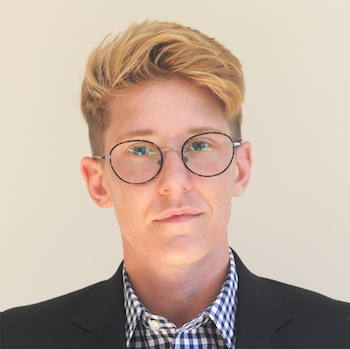
Alec Zuercher Reichardt
Kinder Institute Faculty,
Kinder Institute Associate Professor of Constitutional Democracy, Associate Professor of History, reichardta@missouri.edu
Alec Zuercher Reichardt received a Ph.D. at Yale University and currently serves as an Associate Professor of Constitutional Democracy and an Assistant Professor of History, joining the Kinder Institute in 2018 after spending a year as a junior visiting fellow at the Center for Humanities & Information at the Pennsylvania State University. Prof. Reichardt’s research revolves around 18th century European and Indigenous empires in North America and the Atlantic World, as seen in the 2025 University of Pennsylvania Press monograph, Roads to Power, Roads to Crisis, which examines the contest for the American Interior in the decades before the American Revolution and maps the development of communications infrastructure over the long Seven Years’ War. Prof. Reichardt’s next project will turn toward the spatial politics of native and Euro-American transportation landscapes, from the colonial period through the rise of the early American state.
Jarod Roll

Jarod Roll
Kinder Institute Faculty,
Kinder Institute Professor of Missouri History & Constitutional Democracy, Professor of History, jroll@missouri.edu
Professor Jarod Roll specializes in modern United States labor and working-class history, with an emphasis on Missouri. His scholarship has focused on rural workers, both agricultural and industrial. Roll’s teaching interests also include American political and social history from the Gilded Age to the Great Society, especially in the New Deal era. He received his PhD in History from Northwestern University.
Roll is the author of Poor Man’s Fortune: White Working-Class Conservativism in American Metal Mining, 1850-1950 (2020) and Spirit of Rebellion: Labor and Religion in the New Cotton South (2010). He is coauthor of The Gospel of the Working Class: Labor’s Southern Prophets in New Deal America (2011). His books have won the Clark Spence Award from the Mining History Association, the H. L. Mitchell Award from the Southern Historical Association, the C. L. R. James Award from the Working Class History Association, and the Missouri History Book Award from the State Historical Society of Missouri. Roll’s essays have appeared in several edited collections as well as the Journal of Southern History, LABOR, Labor History, Religion and American Culture, and Radical History Review, among other journals. He is currently completing a coauthored study of the Congress of Industrial Organization’s union of agricultural workers from the Great Depression to the Cold War.
Prior to joining the University of Missouri, Roll taught at the University of Mississippi and the University of Sussex. A native of Mount Vernon, Missouri, Roll received his BA in History from Missouri Southern State University. His hobbies include hiking and rooting for the St. Louis Cardinals.
Lily Santoro

Lily Santoro
Kinder Institute Faculty,
Kinder Institute Associate Teaching Professor of Constitutional Democracy and History, lsantoro@missouri.edu
Dr. Lily Santoro is an Associate Teaching Professor in the Department of History and the Kinder Institute on Constitutional Democracy, where she teaches courses in early American History and public History. She is the coordinator for the Kinder MA program in Atlantic History and Politics and leads the Kinder Public History ASH Team in their work to promote, document, and historicize the US Semiquincentennial.
Dr. Santoro is an active public historian with experience as a project archivist, collections assistant, exhibit curator, and museum consultant. In partnership with the Bollinger Center for Regional History, she is spearheading the Southeast Missouri History Gateway project, a digital history project that provides training, consultation, and a digital platform to under-resourced cultural heritage institutions to digitize archival collections for public access.
Dr. Santoro’s current research explores the discourse of popularized science, religion, and citizenship in mid-nineteenth century African American newspapers. Focusing on discussions of topics such as polygenesis and comparative anatomy, this study attempts to expand our understanding of the conversations the Black community had among themselves about scientific and theological racism and citizenship as the politics of race shifted between the 1820s and 1870s. Her previous publications focused on the popularization of science in early national Philadelphia and ideas of national identity in popular print culture such as almanacs and periodicals in the late eighteenth-century Anglophone Atlantic.
Dr. Santoro earned her Ph.D. and M.A. in American History from the University of Delaware and completed her B.A. in History at the University of Southern California. She holds certificates in Museum Studies from the University of Delaware and Digital Archives and Records Management from San Jose State University.
Jay Sexton

Jay Sexton
Kinder Institute Faculty, Advisory Board,
Rich and Nancy Kinder Chair of Constitutional Democracy, Professor of History, Kinder Institute Director, sextonj@missouri.edu
Jay Sexton is the Rich and Nancy Kinder Chair of Constitutional Democracy, Professor of History, and Director of the Kinder Institute at the University of Missouri. He is also currently serving as President of the Society of American Foreign Relations (2025–2026).
A native of Salina, Kansas, Sexton returned to the Midwest in 2016 after spending the better part of two decades at Oxford University. He began there as a Marshall Scholar and rose to become Director of the Rothermere American Institute (RAI). Upon his departure, he was elected a Distinguished Fellow of the RAI and an Emeritus Fellow of Corpus Christi College.
Sexton specializes in the political and economic history of the nineteenth century, situating the United States within its international context, especially in relation to the British Empire. In A Nation Forged by Crisis: A New American History (Basic Books, 2018), he argues that moments of transformative change in U.S. history have been shaped by international forces.
His other works include Debtor Diplomacy: Finance and American Foreign Relations in the Civil War Era, 1837–1873 (Oxford, 2005; 2nd ed. 2014) and The Monroe Doctrine: Empire and Nation in Nineteenth-Century America (Hill and Wang, 2011). He has co-edited several collaborative volumes: The Global Lincoln (with Richard Carwardine), Empire’s Twin (with Ian Tyrrell), Crossing Empires (with Kristin Hoganson), and The Cambridge History of America in the World: Vol. 2 (also with Hoganson).
Sexton is currently at work on three projects: a book on how steam infrastructure shaped U.S. relations with the world in the second half of the nineteenth century; a new study of the Kansas–Missouri borderlands; and a collaborative volume (co-edited with Billy Coleman and Lily Santoro) offering global perspectives on the United States at its 250th anniversary.
Sexton enjoys working with enterprising students, undergraduate or graduate, who set their own intellectual agendas. When not reading or talking history, he cheers for Kansas City sports teams and keeps a close eye on British politics.
.
Charles U. Zug

Charles U. Zug
Kinder Institute Faculty,
Kinder Institute Assistant Professor of Constitutional Democracy, Assistant Professor of Political Science, czug@missouri.edu
Charles U. Zug is Assistant Professor of Political Science in the Truman School of Government and Public Affairs and Assistant Professor of Constitutional Democracy in the Kinder Institute on Constitutional Democracy. He received his PhD in Government from the University of Texas at Austin.
Charles works on American political institutions, with a focus on American political development (APD), the presidency, and constitutional theory. Charles uses an open-ended, multi-methods approach to study American politics, including archival research, process tracing, and interpretive methodology.
Charles is the author of two books, Demagogues in American Politics (Oxford University Press, 2022) and Dwight D. Eisenhower and the Federal Highway Act (University Press of Kansas, 2024). His third book, The Mythology of American Federalism, is under contract at Oxford University Press. He is also co-editor of and a contributor to Beyond Checks and Balances (University of Pennsylvania Press, 2026). In addition to essays, book chapters, and political commentary, Charles has authored peer-reviewed articles in journals including Political Research Quarterly, Political Science Quarterly, Journal of Law and Courts, Presidential Studies Quarterly, and American Political Thought.
Students interested in pursuing graduate work in political science at Mizzou are welcome to email Charles directly.
FEATURED NEWS
June 18, 2025
May 19, 2025
March 21, 2025
February 17, 2025
